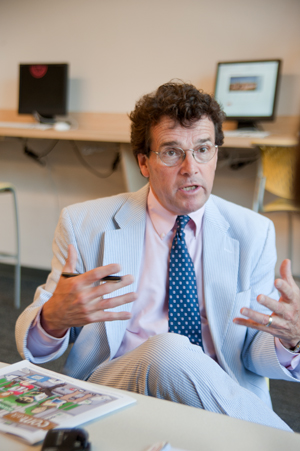WikiLeaks: No More Secrets
COM Dean Tom Fiedler says whistle-blowing website has rewritten the rules

There’s at least one good thing the internet has done for journalism. It has frustrated intelligence agencies’ efforts to halt the publication of embarrassing documents. Yesterday, the New York Times, the Guardian, and Der Spiegel published a massive cache of papers suggesting, among other things, that Pakistan colluded with Al Qaeda while pocketing $1 billion in annual aid from American taxpayers. The Times and the two overseas publications obtained the document dump from WikiLeaks, an online publisher of leaked documents purporting to reveal government or corporate misbehavior.
Tom Fiedler, dean of the College of Communication, says the move is a reminder of how far we’ve come from the world of the Pentagon Papers, which the Times and other papers made public in 1971.
BU Today spoke with Fiedler (COM’71), a former editor of the Miami Herald, about the ethical implications of the increasing ease and speed of publishing sensitive material.
BU Today: The government says WikiLeaks endangered lives with its disclosures. Do you believe the government?
Fiedler: I don’t disbelieve the government. The fact of the matter is you don’t know if you are going to endanger lives when you do something like this. You’re trying to weigh, sitting in the editor’s chair, the public interest versus the government’s interest. All you can do is try to exercise due diligence. I applaud the steps the New York Times has taken. They did not name names, beyond the Pakistani retired general who has been the subject of public discussion—
In terms of whether he’s colluding with Al Qaeda?
That’s right. They also took steps to not publish documents that would compromise intelligence gathering. There’s a lot of stuff in that raw data that the Times apparently chose not to run. There could be information that compromises U.S. servicemen, intelligence.
Are you comfortable with the Pentagon Papers model, in which the media decide what to publish, subject to the ultimate decision of the Supreme Court?
The other element there is the editors decide based on the Constitution, and on precedent. What the Pentagon Papers case said was that, in a situation like this, it’s the certainty there will be an outcome harmful to the public interest that [makes it] necessary to restrain publication. There’s no question that the Obama administration, though they decried the release of information, sees that this was legal. Now, the government still has the right to prosecute someone for leaking that information. The Times took many steps to validate the information. The government has known about this and took no legal action to restrain publication.
The public has to have access to information important to forming opinion that leads to policy being set. In that framework, you go forward with the information.
You can’t just operate on some assumption that something may happen along the line.
Who is WikiLeaks, and can they be trusted, as we would trust the editors of the Times, to judge whether to disclose?
I don’t know whether they can be trusted. Many of them are former journalists, lawyers. They come at this with the perhaps-uncompromising belief that transparency is necessary. If you have a document you want to leak, WikiLeaks becomes the laundromat that keeps you from being exposed.
When a mainstream news organization gets information, the organization doesn’t say, “Are you a good person?” The organization says, “Is that information verifiable?” It doesn’t matter who WikiLeaks is.
Do you think the government should treat WikiLeaks the same way it treats the Times? It’s conceivable the Times could have said, “We don’t want to touch this stuff, this will endanger lives,” and WikiLeaks could have said, “Too bad, we’ll publish it ourselves.”
The law doesn’t care if you’re the New York Times or if you’re down in your basement and come up with something good. Now, WikiLeaks has echo sites all over the place. You cannot shut them down. That’s the reality of the world that we live in.
Anybody could post any information anywhere on the web. That is the weakness of the internet: when stuff goes up, it’s absolutely raw.
What can intelligence agencies do these days to protect classified information?
The CIA nowadays doesn’t hide information by holding it back. They hide information by putting it out there and clouding it with other information, so you don’t know when a piece is true or false. The only way to protect good information these days is surrounding it with bad information. If I’m in the CIA, I’m going to find a way either to discredit the person who issued that report or put out other information about that particular action—give it to WikiLeaks. Disinformation.
I think the Times acted very responsibly. They apparently were in communication with the White House about what they had. They made every effort that no lives would be put at risk.
Rich Barlow can be reached at barlowr@bu.edu.
Comments & Discussion
Boston University moderates comments to facilitate an informed, substantive, civil conversation. Abusive, profane, self-promotional, misleading, incoherent or off-topic comments will be rejected. Moderators are staffed during regular business hours (EST) and can only accept comments written in English. Statistics or facts must include a citation or a link to the citation.